Inside the Fight for Clean Water in Newark
Denials and delays from city officials have failed to keep residents safe from high levels of lead in their drinking water. These community organizers are busy picking up the slack.
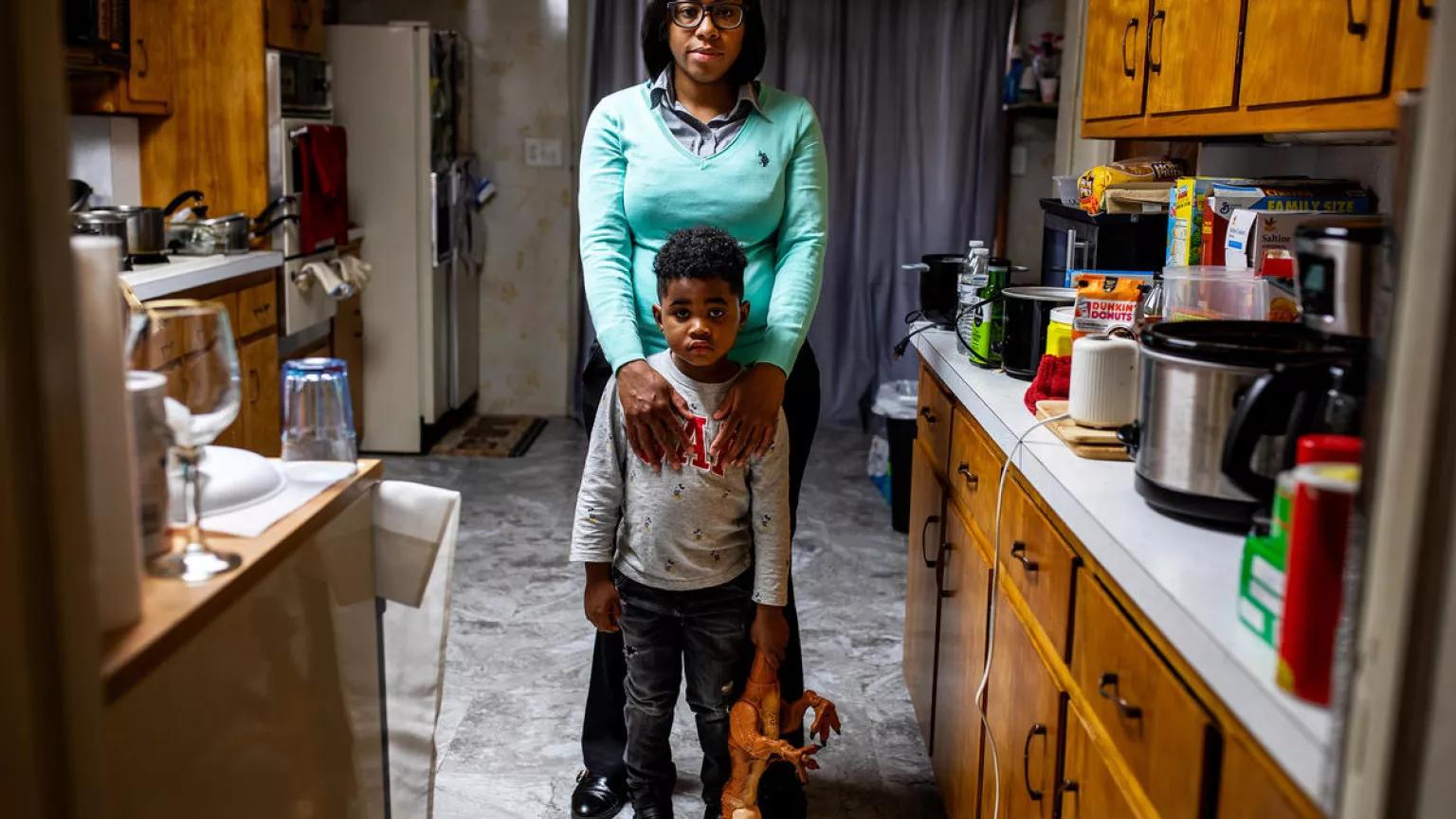
Shakima Thomas and her son, Bryce, in the kitchen of their Newark, New Jersey, home
Demetrius Freeman for NRDC
By the time government officials of Newark, New Jersey, agreed to distribute water filters to some of its residents, they’d been drinking lead-laden tap water for at least 21 months. By the time the city began to acknowledge the problem, it was facing a federal lawsuit and multiple notices for violating the Safe Drinking Water Act.
Signs of a citywide crisis began to emerge in June 2017—publicly, at least. That was when the New Jersey Department of Environmental Protection first flagged Newark’s lead levels as exceeding the federal action level of 15 parts per billion over a six-month monitoring period. In fact, more than 10 percent of the homes sampled had levels nearly twice that. (Later, some homes would test higher than 36 or 64 times the federal action level.)
The crisis, however, began long before that summer, when the city failed to take the necessary steps at the Pequannock Treatment Plant to stop its water from corroding lead pipes and plumbing. As a result, lead began leaching into the city’s drinking water at an alarming rate. Even low levels of exposure to this heavy metal have been linked to potentially irreversible damage to developing brains and nervous systems. Lead exposure can also cause adverse effects in adults, such as fertility issues, cognitive dysfunction, cardiovascular and kidney problems, and elevated blood pressure. Children and pregnant women are most at risk, and indeed, for years, Newark has had the greatest number of lead-poisoned children in New Jersey.
In September 2017, NRDC, along with 10 local and state groups, sent the city a letter requesting quick action to protect its most vulnerable residents. Yet by the end of 2017, Newark had exceeded the federal action level for lead in drinking water for the second consecutive monitoring period. Worse, Newark failed to notify residents of how to best protect themselves—a requirement of the Safe Drinking Water Act.
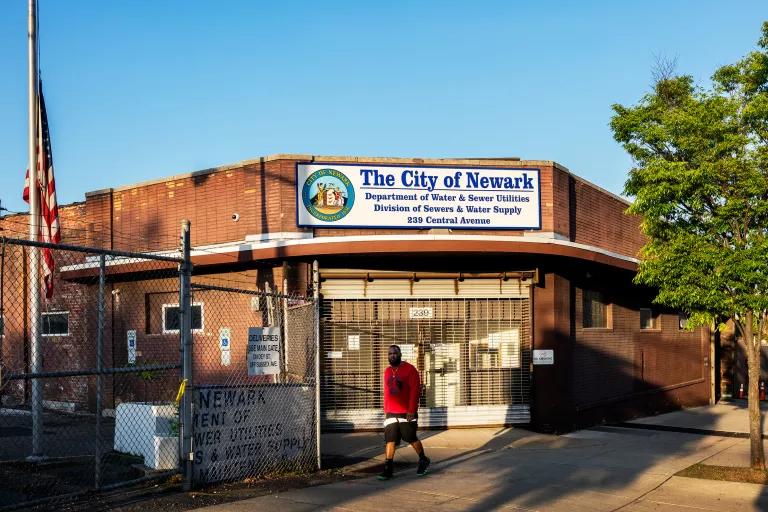
Only certain Newark residents have access to free water filters at limited distribution points.
Demetrius Freeman for NRDC
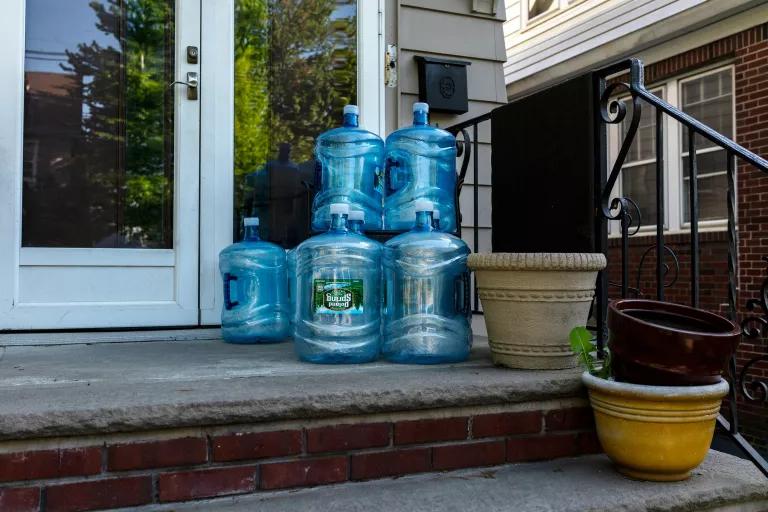
Water bottles awaiting pickup on the porch of a Newark home
Demetrius Freeman for NRDC
By the following June, a year after the first violation notice and right before a third was issued, NRDC, alongside a group of public-school educators, the Newark Education Workers Caucus (NEW Caucus), sued the city of Newark and some city and state officials.
The news, of course, had now picked up momentum. The story was similar to another notorious lead controversy—the one in Flint, Michigan. Both crises featured among the highest tap water lead levels of any large city in the country. Both had city officials repeatedly saying there was no problem, in the face of clear evidence to the contrary. Both affected low-income, predominantly black communities. And both required a citizen lawsuit to spur action.
Meanwhile, lead levels continued to rise. In December 2018, Newark received its fourth consecutive notice of violation from the state environmental agency. At the start of 2019, more than 10 percent of homes citywide had reported levels above 65 parts per billion—more than four times the federal action level. Many Newark residents—now misled, outraged, and scared—began taking matters into their own hands, arranging to have their water tested privately.
Talk to those residents about the lead crisis, and a word you’ll hear often is trust. You’ll hear about the myriad ways it was broken, and skepticism about how it will be repaired. But residents are pulling together to do what their city would not. Groups like the Newark Water Coalition and NEW Caucus are knocking on doors, spreading critical public health information, and speaking truth to power at city meetings. These residents and activists are fighting to right a dangerous wrong in a city that, ultimately, they love. Here are some of their stories, as shared through interviews and testimony in support of the lawsuit filed by NEW Caucus and NRDC.
Sabre Bee
Cofounder, Newark Water Coalition, and resident of Newark’s North Ward
Every week, Sabre Bee purchases as many as five three-gallon water jugs and lugs them home, to avoid using the lead-contaminated tap water supplied by the city. She then carries the heavy jugs to various rooms in the house: a jug for drinking and cooking in the kitchen, another for brushing teeth in the bathroom.
The chore is costly and physically exhausting, and in spite of it, Bee says she still feels terrified. She lives with her mother, who is recovering from breast cancer and needs Bee’s help around the house. Lead exposure poses an increased risk to people who already have medical conditions, and Bee is anxious about its impact on her mother’s health. Knowing its well-documented effects on young children, she also worries on behalf of her three-year-old nephew, who visits every weekend.
The city has done little to ease this burden. Bee visited a distribution site to pick up a water filter from the city, but she received no replacement cartridges nor any explanation on how to install it or use it. Ultimately, her neighbor had to force the filter into place. “It was basically garbage,” Bee says. “It didn’t fit the sink, and you couldn’t even tell if the filter kept you safe from lead.” When it petered out just a month later, the city refused to replace it, and Bee had to buy her own.
Getting a proper lead test conducted at her home, a measure promised to all residents by city officials, has also been difficult. The city did the first test improperly. The second test came back with lead levels at 16 parts per billion, just above the federal action limit. Bee is planning to have private tests done because she’s concerned the city is deflating the numbers, even though additional testing will undoubtedly mean more cost and more time off work.
Ultimately, Bee characterizes Newark’s response as strictly “PR control.” From alerting residents to the problem, to adequately testing, to giving out filters, “the city failed,” she says.
With fellow resident Anthony Diaz, Bee founded the Newark Water Coalition. The coalition has created its own informational packets using material from the state, NRDC, and the U.S. Environmental Protection Agency. “Now we’re the ones walking around neighborhoods,” she says.
Anthony Diaz
Cofounder, Newark Water Coalition
Anthony Diaz is finding victories where he can. “I would love to have rallies with thousands of people, but today, victory might just mean giving a water filter to one person with lead-contaminated water,” he says. “I’m still showing up to be of service.”
Diaz traces his activist roots back to his teenage years, when he started Science Park High School’s first student union in the University Heights section of Newark. Later, he became involved with Newark’s Black Lives Matter movement and joined a group of other young progressives who called themselves “A Movement of the People.”
In 2018 Diaz ran his first public campaign for city council, representing Newark’s Central Ward. He didn’t win his election bid, but he has remained a dedicated community advocate. With the support of just a few other residents, he founded the Newark Water Coalition in 2018 as a means of raising public awareness about the city’s water crisis and putting pressure on local officials.
Since its first meeting in December 2018, the group has been a fixture in the city’s fight for clean water—conducting a “teach-in” on the Rutgers University campus, attending city council meetings, and holding filter drives for residents whom the city is neglecting to help. “People are being told their area is not affected, that they don’t qualify for a filter,” Diaz says. “In some cases, they go and the person who’s supposed to give out the filter isn’t there, so they have to wait or come back.”
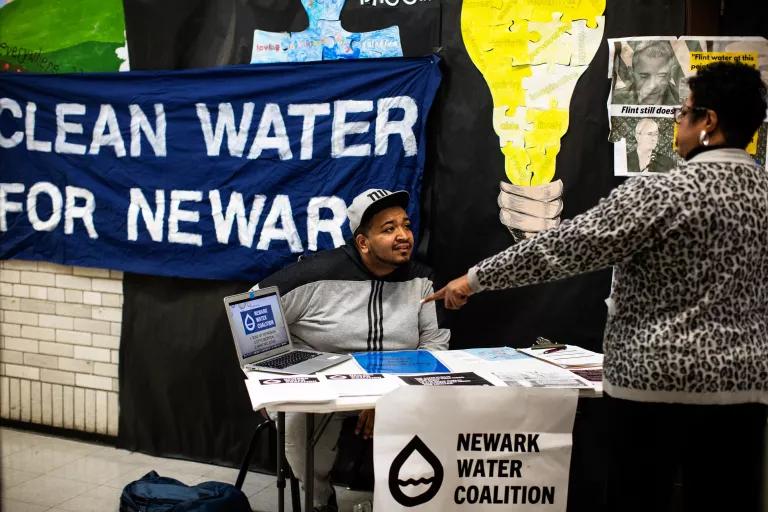
At a Newark Water Coalition meeting, Diaz shares information on the lead contamination.
Demetrius Freeman for NRDC
In addition to providing filters, the Newark Water Coalition is asking for independent monitoring of lead levels “on the city’s dime,” mobile testing sites, and far more public education and transparency from schools, which have not done enough, some argue, to inform parents of the problem. Consistently high lead levels (some nearly 13 times the federal action limit) have been recorded in schools as far back as 2010, but attention to the problem began to surface only in 2016.
Still, Diaz takes pride in his hometown. “So much of who I am as a person and as a man came from my upbringing in this city. There’s so much grit and so much beauty, but it gets overwritten by crime and gentrification and overdevelopment,” he says. “But I love it, and that’s why I continue to fight for it.”
Shakima Thomas
Resident of Newark’s West Ward
Shakima Thomas’s voice is steady as she describes the night a group of men from Newark’s water department drove to her home after sundown, uninvited and unannounced. Thomas assumes the visit had to do with a social media post she’d made earlier that day: a side-by-side comparison of two lead test readings at her house—one done by the city and the other, significantly higher, done independently. Newark Mayor Ras Baraka even commented on the post when it was shared by a friend, calling it “erroneous information.” Thomas then exchanged a few emails with city officials asking what they planned to do to protect residents. But she hadn’t set a time for a site visit. She had already received a filter from a community organization. She certainly didn’t ask for an after-hours confrontation on her doorstep while she was home alone.
Thomas recalls how a man got out of an unmarked SUV, rang her bell, then knocked loudly on her door. Scared, Thomas called a friend over. When the friend arrived, a second man came out of the car and asked if she was Ms. Thomas, or if she knew where they could find Ms. Thomas. Eventually he said he was there to deliver a water filter, but he never gave that filter to the friend and instead drove away. “I felt they were trying to intimidate me and keep me quiet,” Thomas says. “When I went to the police department, the police didn’t want to file a report because they said no crime was committed.”
Thomas’s experience is one of the more alarming incidents in a series of confrontations between residents and Newark city officials over the lead crisis. Thomas has also witnessed police at city council meetings forcing residents to leave the podium while speaking. Rather than giving her necessary public health information, city officials have scolded Thomas for posting her concerns on social media. And she’s watched city council members turn off mics at public meetings after community members said “things they didn’t want to hear,” Thomas says. “Trust has been destroyed.”
Thomas’s voice cracks when she describes the impact the contaminated water has had on her son, Bryce, who will be starting kindergarten in the fall. After finding out her home’s water-lead level measured a staggering 76.2 parts per billion in February, she took Bryce to a public health office. Sure enough, the heavy metal had gotten into his blood. “I was in denial,” Thomas says. Now she’s doing all she can to get the lead out of his body so it doesn’t continue to impair his development.
“I try to feed him things that are supposed to be good for his health, like spinach,” Thomas says. “That’s been difficult. And I have to constantly monitor him when we’re taking a bath so that he doesn’t put the water in his mouth. But he thinks it’s a game, so sometimes he’ll do the things I tell him not to do. It’s hard. I don’t want to yell at him or traumatize him, but the water isn’t safe. I can see him looking at me, though, and thinking, ‘If it’s not safe, then why am I in the tub? Why are you washing dishes with it?’ I can’t rationalize it.”
Yvette Jordan
Founding member, NEW Caucus, and resident of Newark’s South Ward
When she first tells her students at Central High School about the lead in the water, Yvette Jordan says, about three-quarters of them have no clue. And neither do their parents. So Jordan sets out to teach them about the problem. The response is natural for Jordan, who founded NEW Caucus in 2012 with a group of other public-school educators to advocate for social justice in their district. “We were concerned about the lack of input from parents and teachers in education reform,” she says.
Recently, in her Introduction to Social Justice class, Jordan included a lesson on environmental justice. She discussed the lead in Newark’s water—in her students’ own homes—and shared articles and photos from Flint to help them understand the similarities.
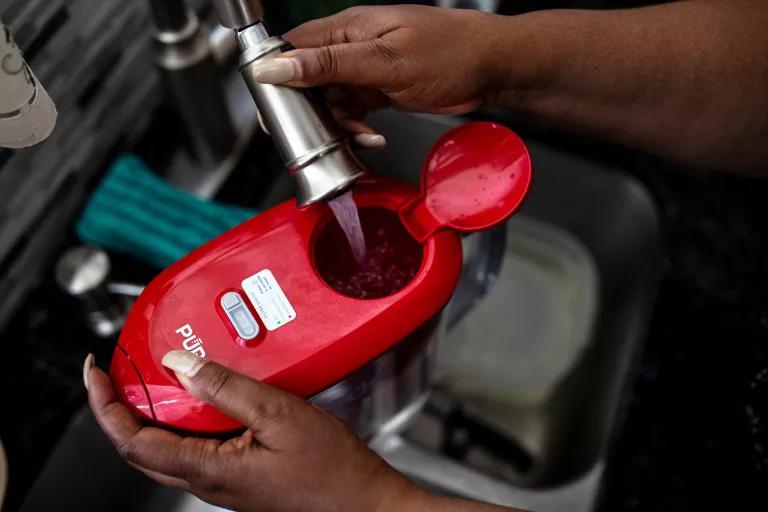
Demetrius Freeman for NRDC
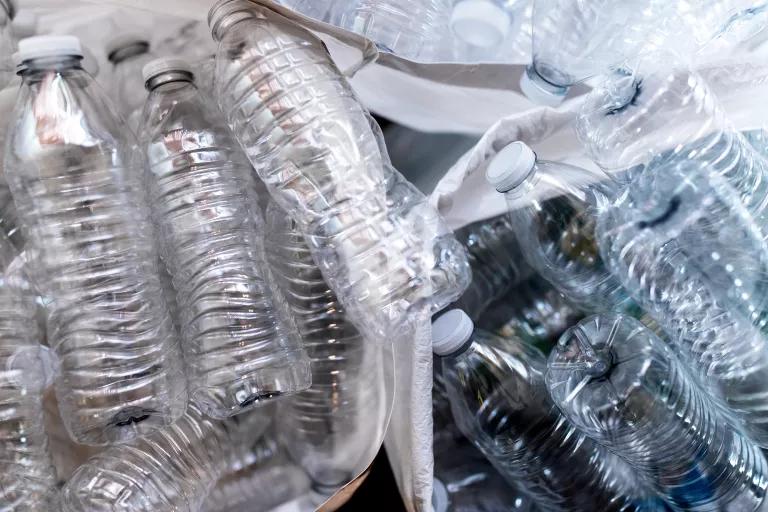
Demetrius Freeman for NRDC
“Their response was that it was more of the same,” Jordan says. “They said, ‘OK, we know this is happening. It’s awful, but what do you expect? That’s what we get here.’ ” Jordan’s students felt resigned to the inequity, just as they did when she shared stories of neglect after Hurricane Katrina in New Orleans. “See, that’s what happens in areas of high poverty,” they told her.
Jordan continues to worry. Almost 30 percent of the students at Central High School have special needs, and she is concerned that exposure to lead may be a contributing factor in some of their developmental challenges. Most parents, she says, are still not using water filters or are unsure of how to get them from the city. Other parents work long hours or multiple jobs and simply can’t get to the distribution sites when they are open.
Worse, those who visited the city’s website in 2018 looking for information about the crisis would have read that the water was safe to drink. Jordan, who had her own water tested in July 2018, knew not to take the city’s word for it. Samples of her water contained 42.2 parts per billion of lead. But most residents weren’t as aware of the danger lurking at their taps. “Only if you’re really sticking your nose out there and reading up on what everyone’s saying do you get a clearer picture,” she says.
Jordan considers it her duty to share her knowledge with her students, their parents, and her neighbors. She estimates she spends at least three hours a week attending community meetings and encouraging fellow residents to press the city’s leaders to do more. After all—as so many Newarkers agree—their city is worth the work.
If you live in Newark, check your address on the city’s database to see whether your home is listed as having a lead service line. The city says free water testing is available for all residents; to arrange it, call 973-733-6303 or email waterandsewer@ci.newark.nj.us. For independent testing, Healthy Babies Bright Futures lets you pay what you can afford for the test.
If you have tried to obtain a water filter from the city but have been denied, consider taking these steps to minimize your risk of exposure. If you have experienced difficulty getting your water tested by the city or receiving a filter through the city’s program, email NRDC at safewater4newark@nrdc.org.
This NRDC.org story is available for online republication by news media outlets or nonprofits under these conditions: The writer(s) must be credited with a byline; you must note prominently that the story was originally published by NRDC.org and link to the original; the story cannot be edited (beyond simple things such as grammar); you can’t resell the story in any form or grant republishing rights to other outlets; you can’t republish our material wholesale or automatically—you need to select stories individually; you can’t republish the photos or graphics on our site without specific permission; you should drop us a note to let us know when you’ve used one of our stories.

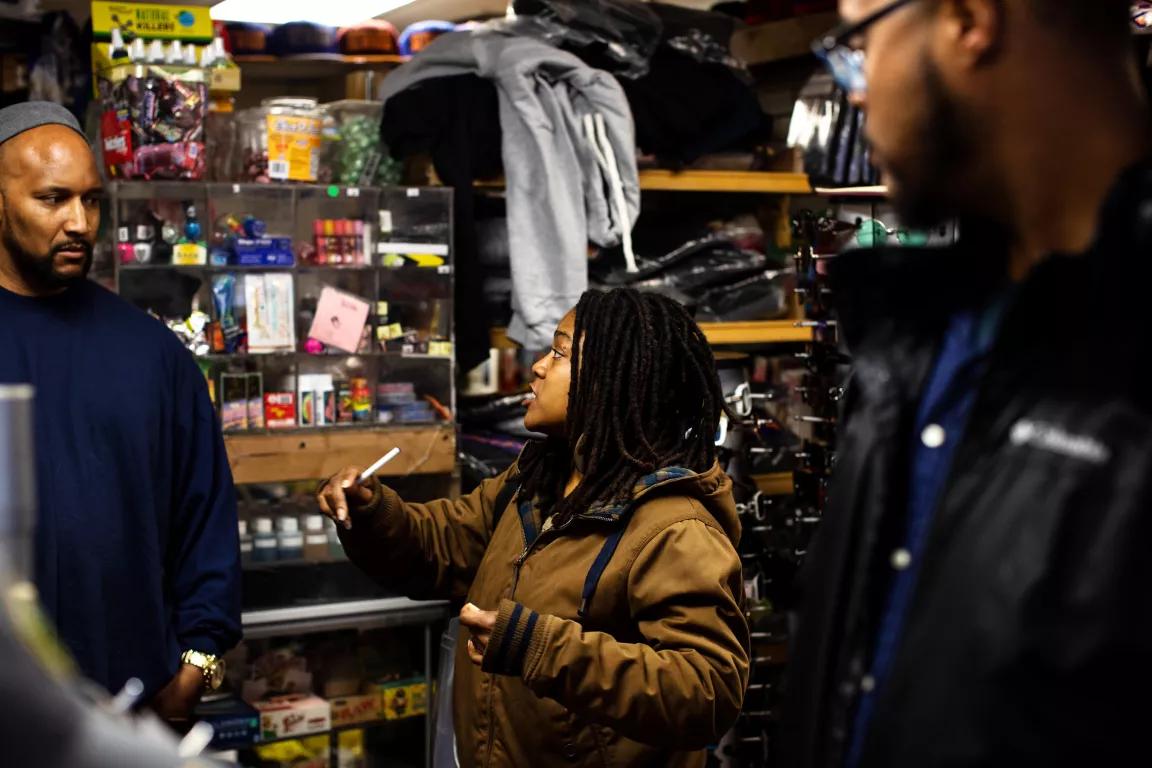
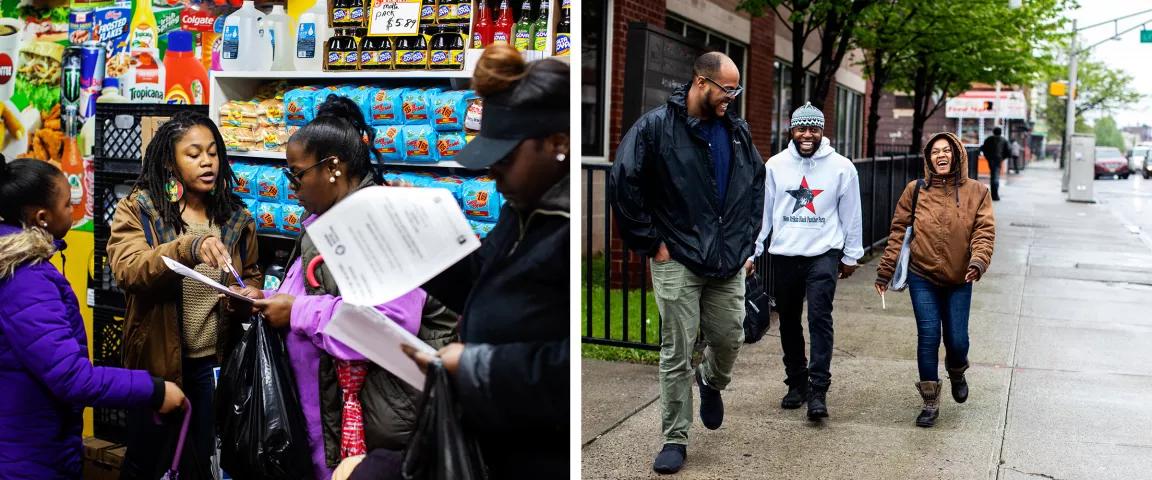
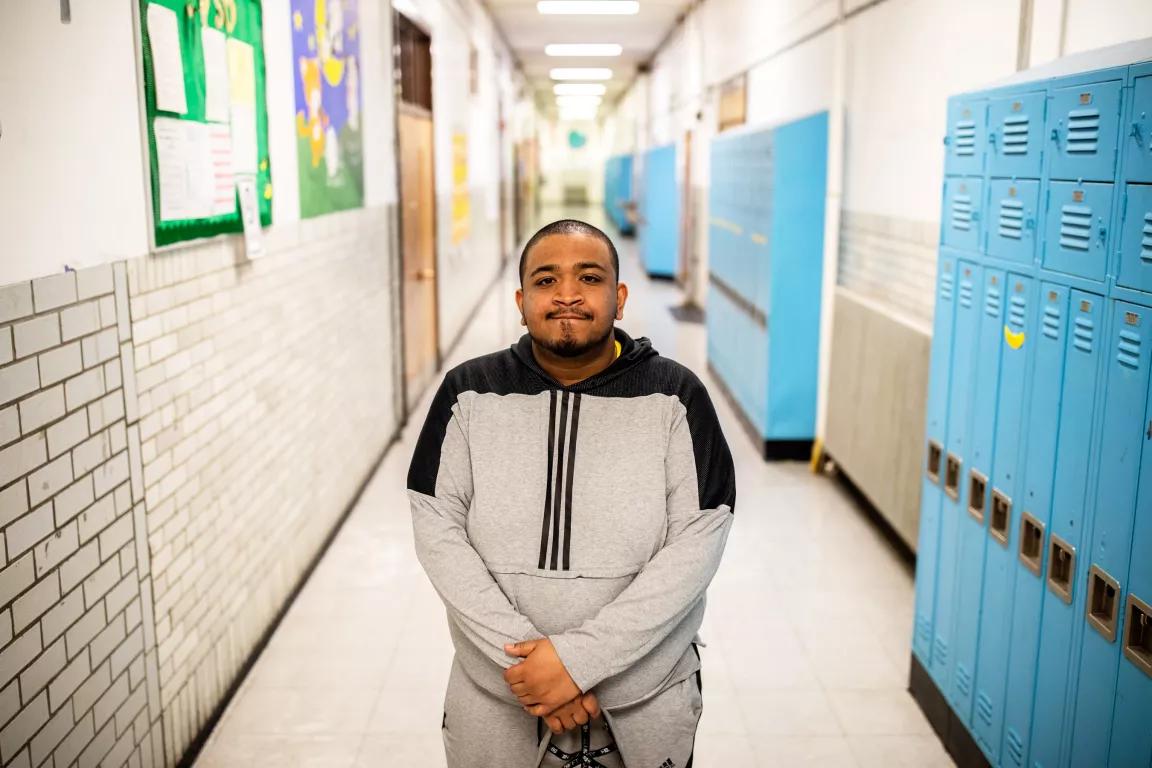
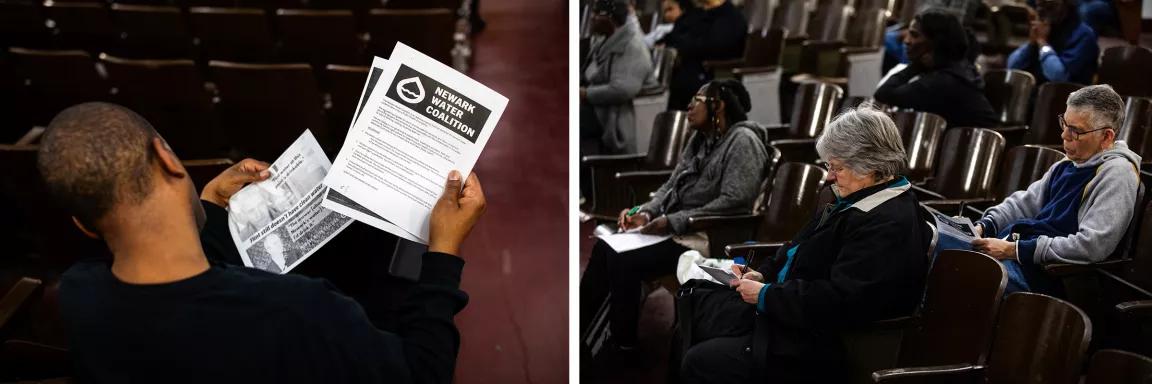
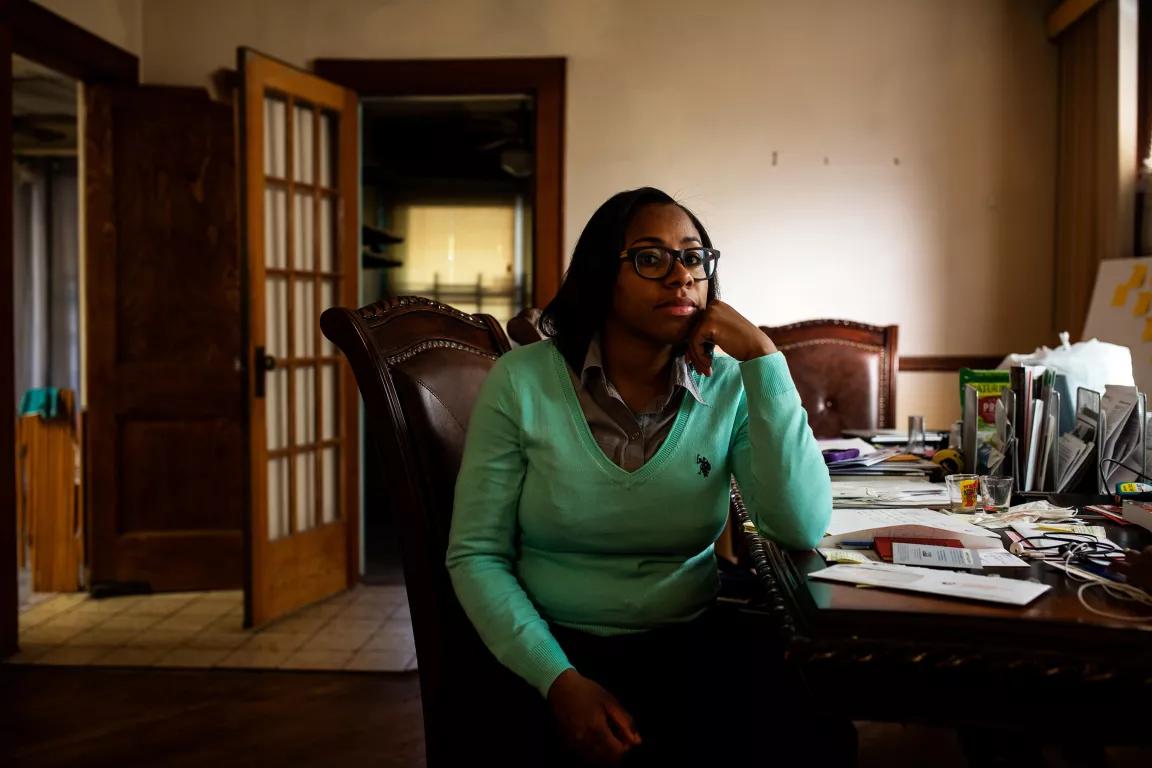
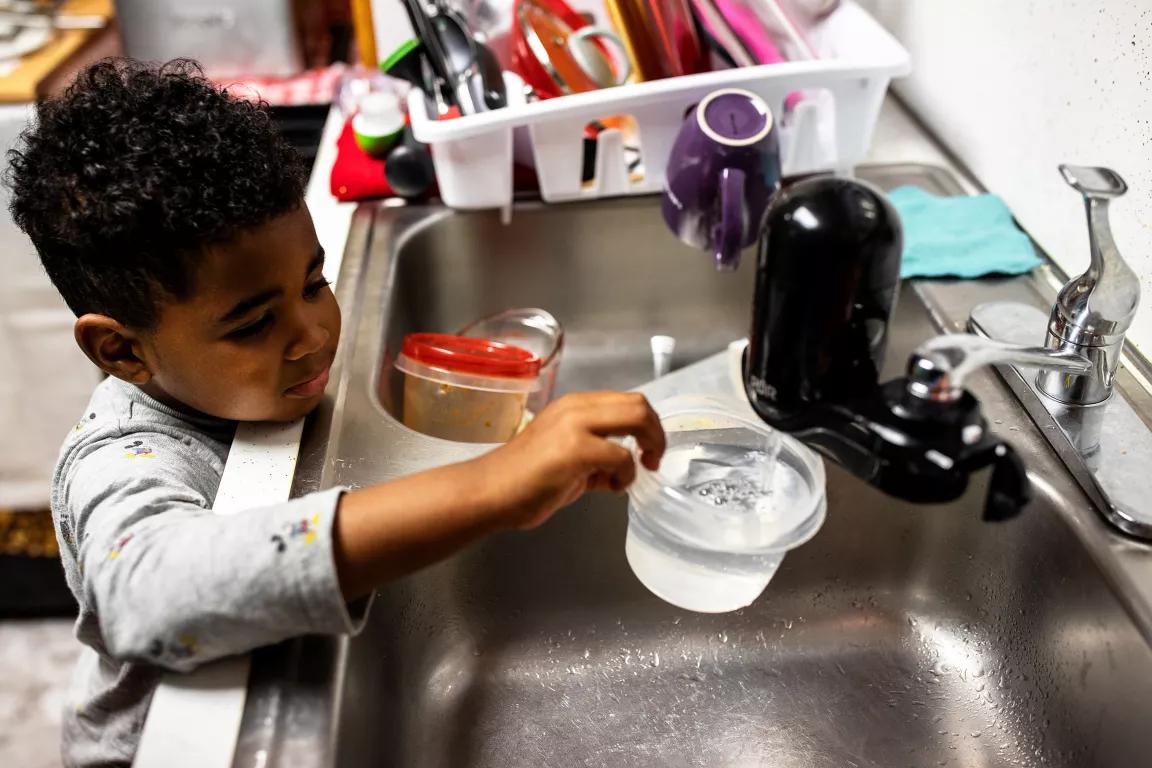
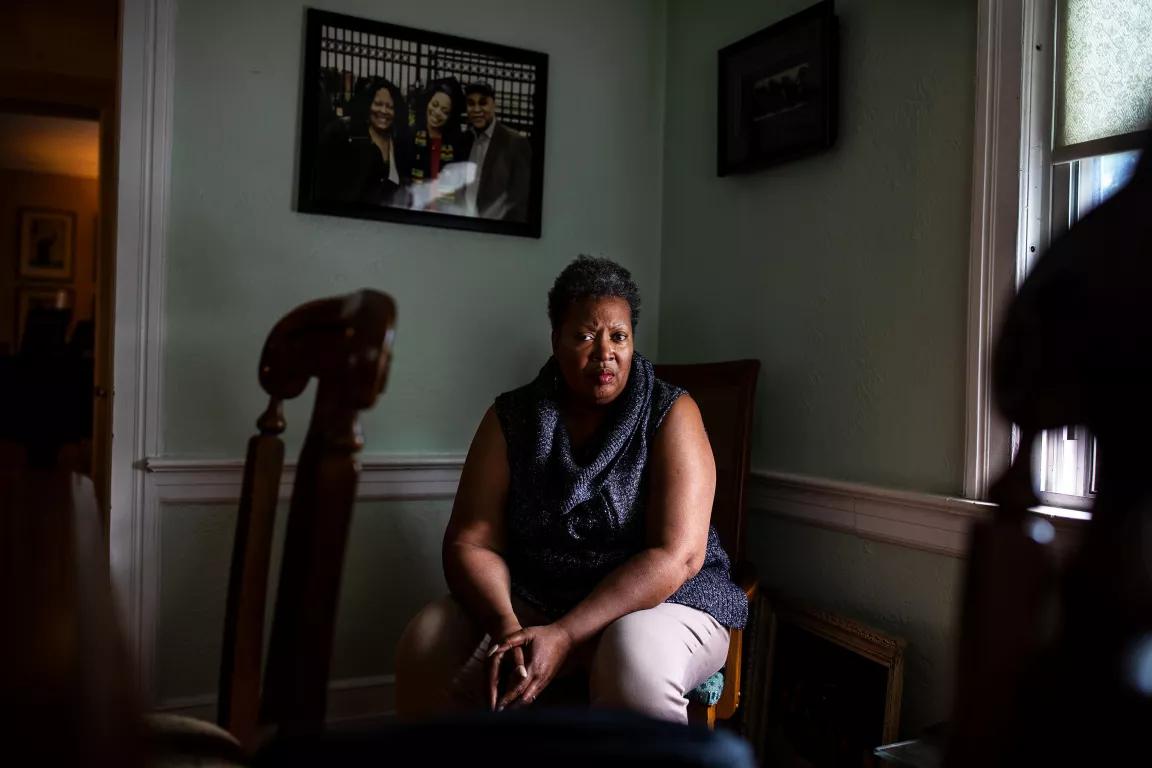
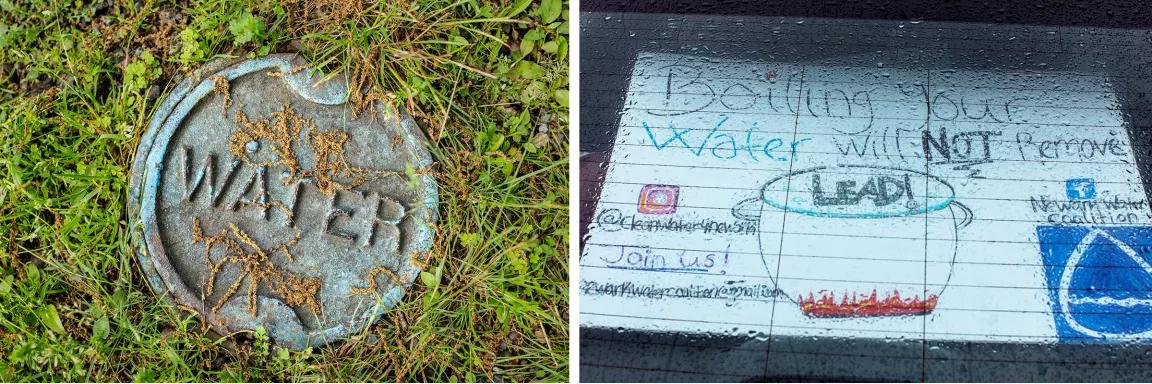
An Environmental Justice Advocate Inspires Others to Become Agents of Change
Fighting the Tide of Watered Down Justice
What Can We Do to Fix the Drinking Water Problem in America?